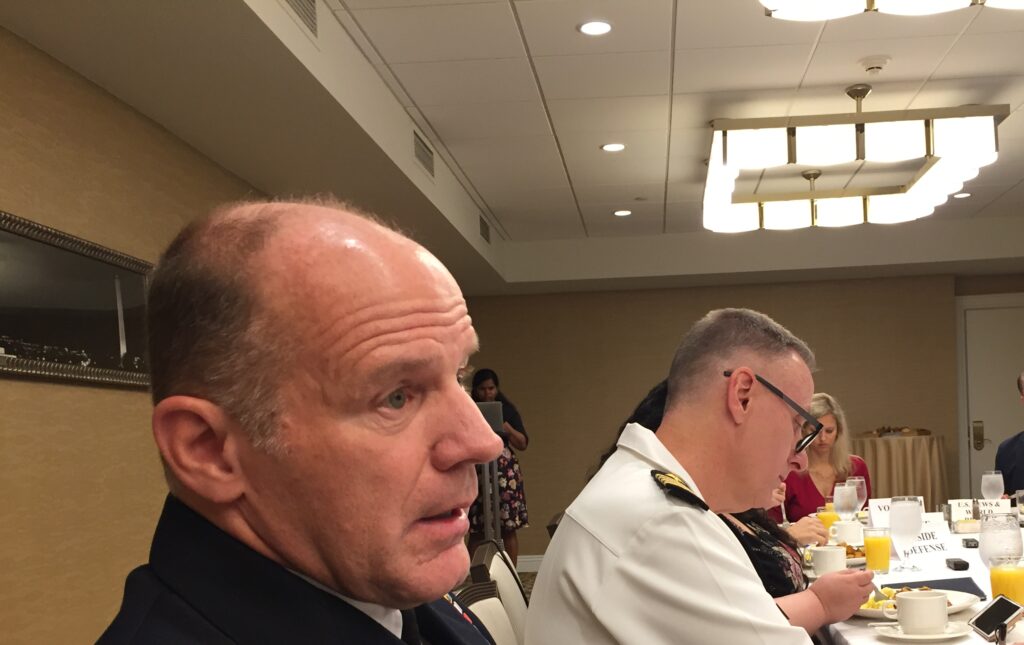TRANSCOM Chief Lyons: No Plan To Delay Retirement of More KC-135s
Posted on

Gen. Stephen Lyons
WASHINGTON: Transportation Command (TRANSCOM) is studying future mobility requirements to project out past the next five years as a way to follow-up on a congressionally mandated study released in February, says Transportation Command head Gen. Stephen Lyons.
“It’s a pretty important document because it drives force sizing and shaping for the mobility forces for the department,” Lyons told reporters this morning. While the previous “Mobility Capabilities and Requirements Study 2018” was bounded within the 2019 to 2023 five-year defense programming (FYDP) plan, Lyons said the new study “will have a view toward the future.” He explained that limiting the study to the FYDP meant that “it’s already too late” to actually do anything to change investment priorities.
TRANSCOM also has “broadened the scope considerably” to “meet the National Defense Strategy,” including looking at future requirements that will have to contend with Russia and China, and raising the level of resiliency in the service-wide transportation fleet.
However, there currently are no plans to increase the number of ancient KC-135 Stratotankers being held back from planned retirement, or to cover for the most recent delays in Boeing’s delivery of the troubled KC-46 tanker refueling aircraft.
“Whether the number is 28 [aircraft] or some other number, for me it’s a function of capability over time,” Lyons said. “It’s largely conditioned-based; it’s not as much a finite number of tails as it is that we need to ensure we don’t drop in capabilities. … But 28 is a reasonable marker at this period of time.”
The 2018 mobility study, mandated by Congress in the fiscal 2019 National Defense Authorization Act (NDAA), showed an Air Force requirement of 479 tankers, with a mix of KC-135s that make up most of the current fleet and the new KC-46 through 2023. The service intends to buy 179 KC-46s.
The new study is driven in part by the House Armed Services Committee, which in its version of the 2020 NDAA called both a follow-on to the TRANSCOM study, and for an Air Force report on the future of airborne tankers by September 2020. The HASC is so concerned that there may now be a gap in KC-46 delivery and the development of a new tanker that it has instructed the service to consider “acquiring a non-developmental commercial derivative tanker” as a bridge.
Boeing’s latest woes with KC-46 production involve the discovery of a a cargo lock that unlocked itself in mid-air, a glitch that could endanger the safety of personnel or even cause the plane to crash. This followed the discovery of Foreign Object Debris (FOD) in completed aircraft that caused the Air Force to temporarily halt delivery in February. The cascade of problems with the supposedly low-risk plane — with Boeing promising to deliver 18 combat-ready aircraft in 2017 — means war-ready planes are unlikely to deploy for three or four years, Gen. Maryanne Miller, the head of Air Mobility Command, said Sept. 18 during the annual Air Force Association conference.
Up to now, the service has withheld about $500 million in payments for delivered planes until Boeing can fix the major problems. But, the ‘too big to fail’ program nonetheless continues to chug along. The Air Force on last Friday awarded Boeing about $2.6 billion for lot 5 production of the KC-46 tanker, covering 15 aircraft. Work on this production lot is expected to be completed by March 2023, according to the Pentagon announcement.
Another capability that won’t be included in the new requirements study is a platform for delivering logistics through space, as touted by former head of Air Mobility Command Gen. Carlton Everhart. Lyons, the first Army general to head TRANSCOM, is keeping his feet firmly on the ground, saying that while he encourages “creative thinking,” there is no “physical working ongoing” on a space transport plane.
Subscribe to our newsletter
Promotions, new products and sales. Directly to your inbox.
